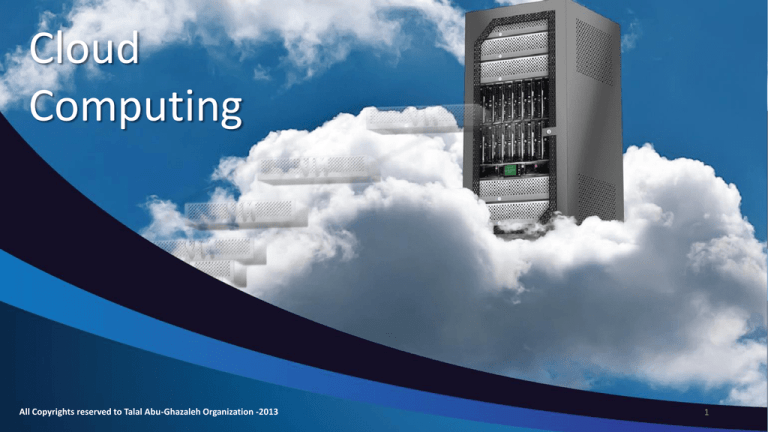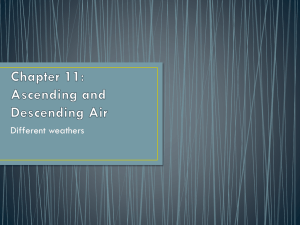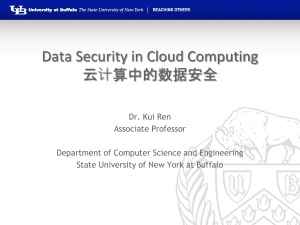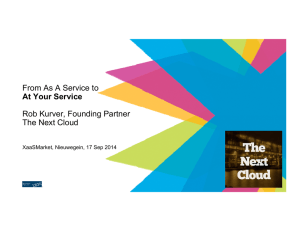What is Cloud Computing - Talal Abu
advertisement

Cloud Computing All Copyrights reserved to Talal Abu-Ghazaleh Organization -2013 1 What is Cloud Computing ? • The Cloud symbol as always been taken as synonymous to Internet, but when combined with "computing," the meaning gets broader and fuzzier. The basic and direct definition for Cloud Computing is virtual servers available over the Internet. • Cloud Computing is a technology that uses the internet or long distance connections and central remote data centers (Servers) to maintain data and applications. Cloud computing allows consumers, businesses and employees to run applications and services without installation, and to access their personal files independent of machine used (PC, Laptop, Smart Phones and Thin Clients) with internet access. This technology allows for much more efficient computing by centralizing data storage, processing and bandwidth. 2 What do Cloud Computing services do ? Cloud Computing Services fall in three categories: IaaS: Infrastructure as a Service, Offering virtualized software and servers to people. It will be hosted within the Cloud data centers, and those beneficiaries pay only the agreed on cost, and do not have to purchase any hardware, software and licensing. PaaS: Platform as a Service, PaaS is the same as IaaS, but with the addition of the application layer, which the customer intends to use. SaaS: Software as a Service, SaaS is offering software to the others remotely as a Web-based service. Software as a Service allows organizations to access business functionality at a cost typically less than paying for licensed applications and using hardware for that application. 3 Cloud Computing Technologies and Types With cloud computing technology, large pools of resources can be connected together in many ways. This technology simplifies infrastructure planning and provides dynamically scalable infrastructure for cloud based applications, data, and file storage. Businesses can choose to deploy applications on Public, Private, Hybrid clouds or the newer Community Cloud. Depending on the organization work nature, location and its infrastructure, we can choose one of the following types of Cloud Computing, to work with: 1. 2. 3. 4. Private Cloud Public Cloud Hybrid Cloud Community Cloud • Each one of the above has its advantages and drawbacks • Types of Cloud Computing technologies might intersect with each other. 4 5 Public Cloud Advantages: • Free or offered on a pay-perusage model. • Easy and inexpensive setup. • No wasted resources because you pay for only what you use. Disadvantages: Amazon, Google, Microsoft are the most known Public Cloud Service providers. • Data security and privacy issues. You may not know where your data is stored, if or how it is backed up, and whether access is given to unauthorized users. • Reliability. Community Cloud Community clouds are designed for businesses and organizations working on joint projects, applications, or research, which requires a central cloud computing facility for building, managing and executing such projects, regardless of the solution rented Cloud. 7 Private Cloud Advantages: • More Security • Most Control over data. Disadvantages: • Most Expensive type of Cloud Computing. • More Support operations and employees are required. • Complexity in implementation. Most private Clouds are structured of already made solutions, offered by many vendors, such as: Microsoft, VMWare and Citrix 8 Hybrid Cloud It allows you to retain sensitive data within your organization, while taking advantage of the lower cost and flexibility of the public cloud. 9 General Notes: • Most social media, such as Facebook, Twitter and Google, might be considered as Public Clouds. • Hybrid Cloud can be the best scenario for a cloud, since it combines the most advantages of other types. • In the Arab World, most organizations use the Public Cloud from International providers. END 10




